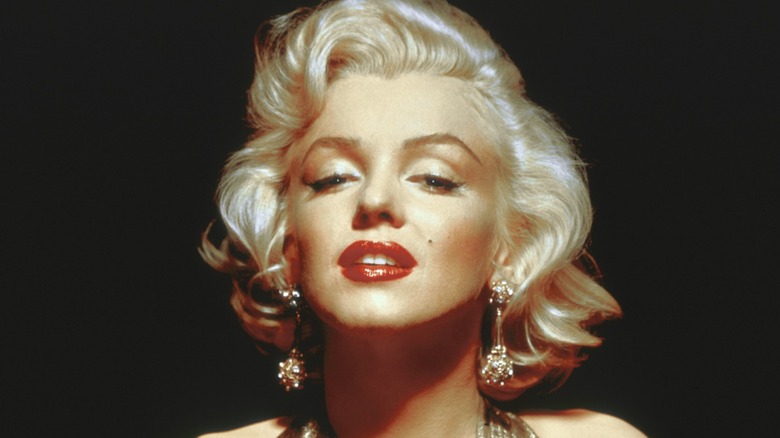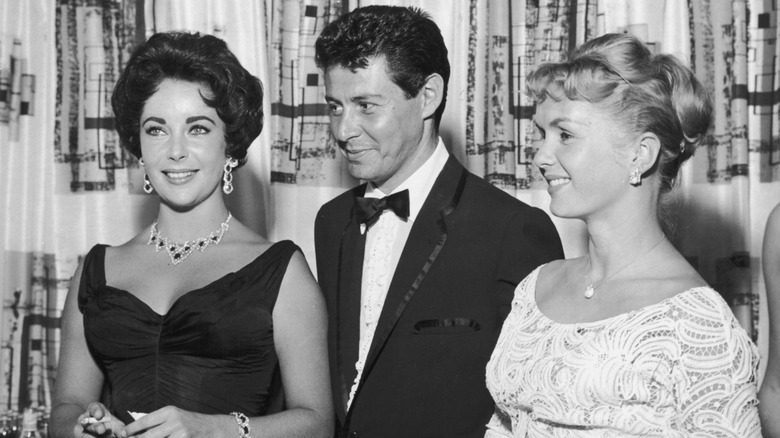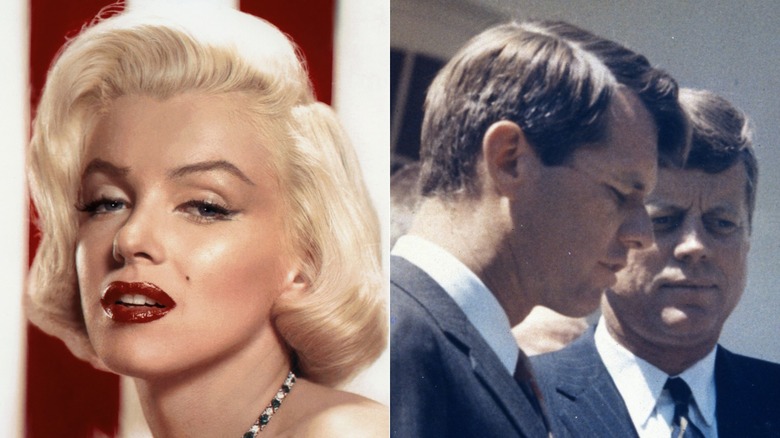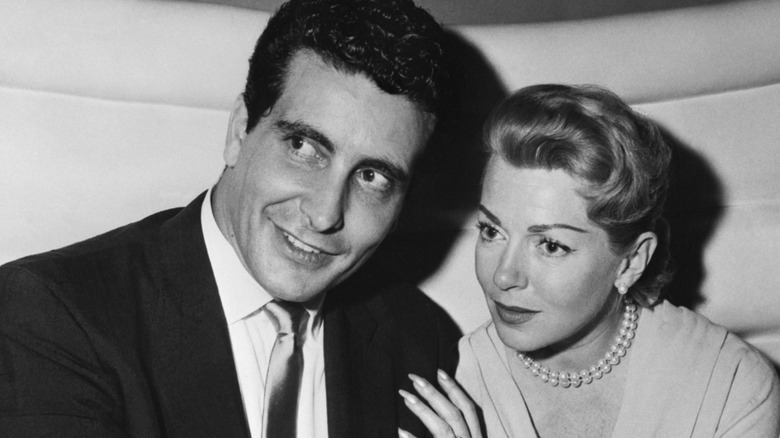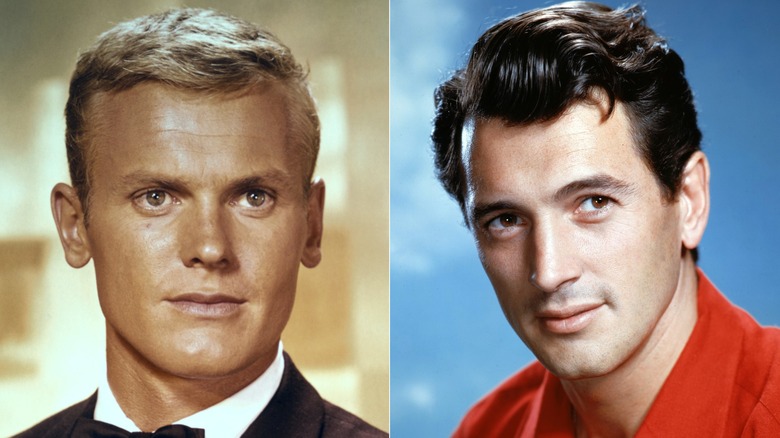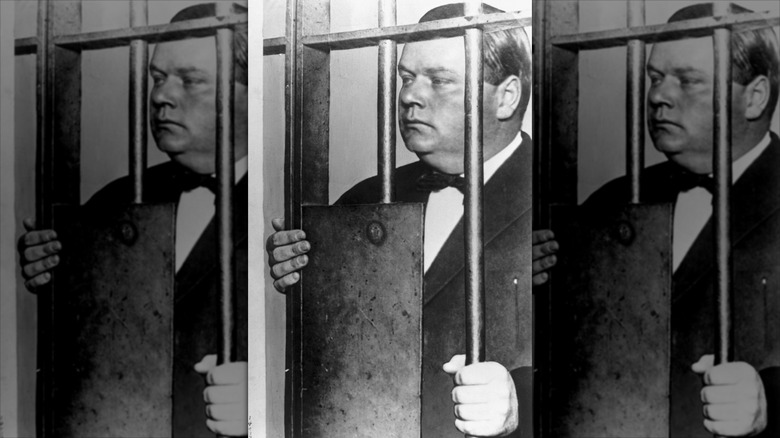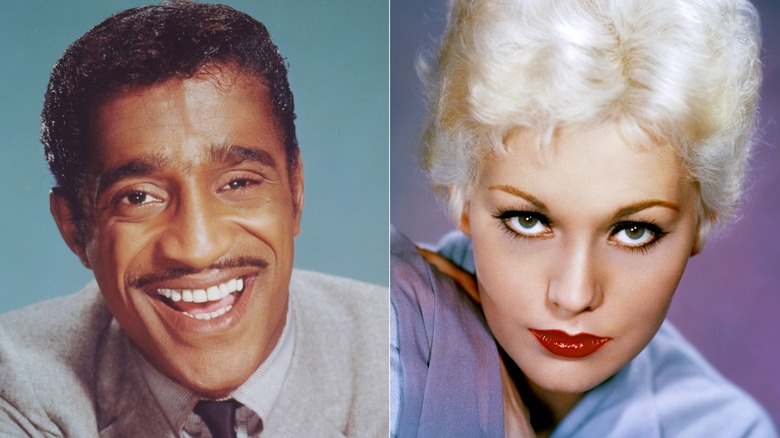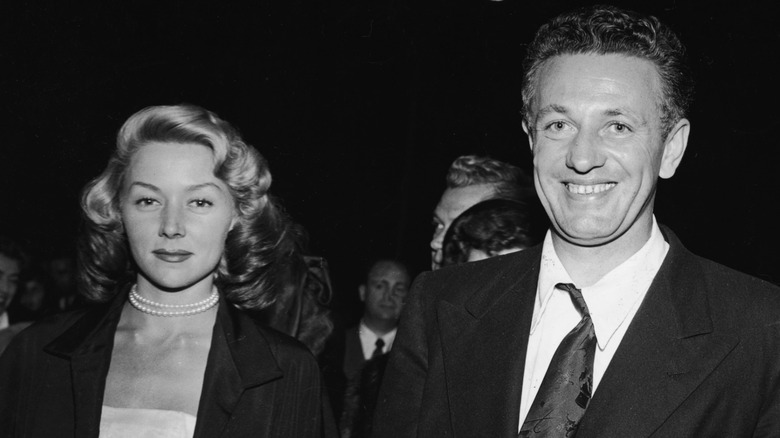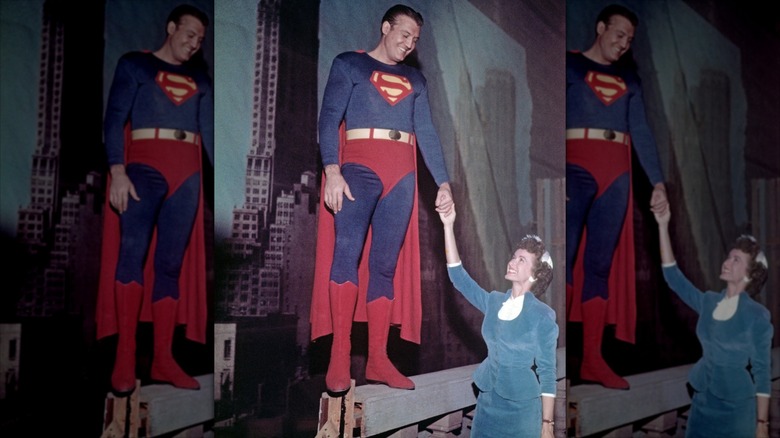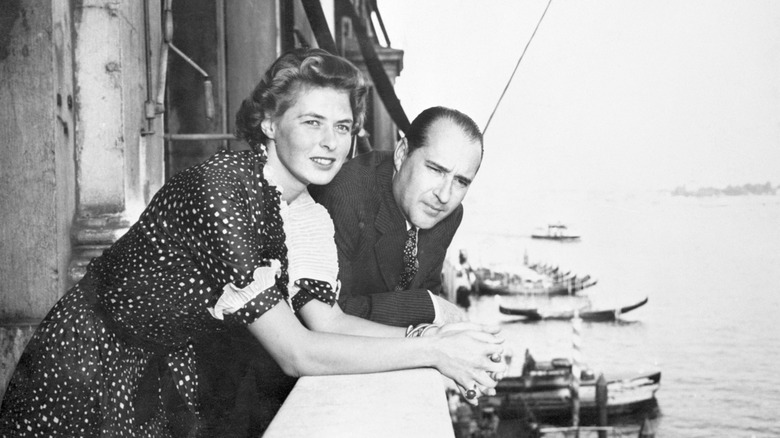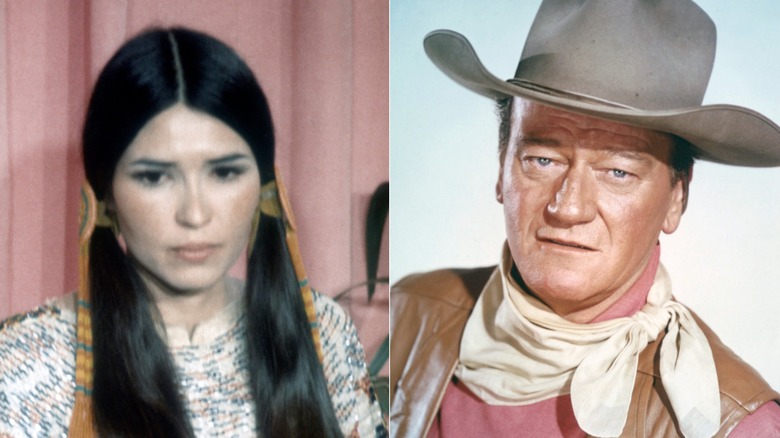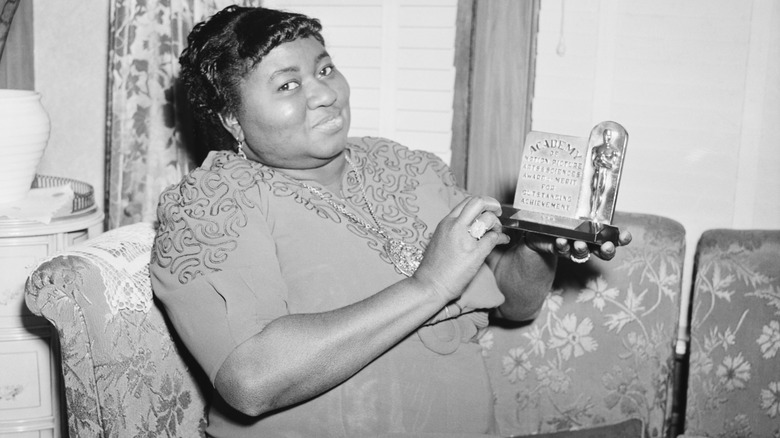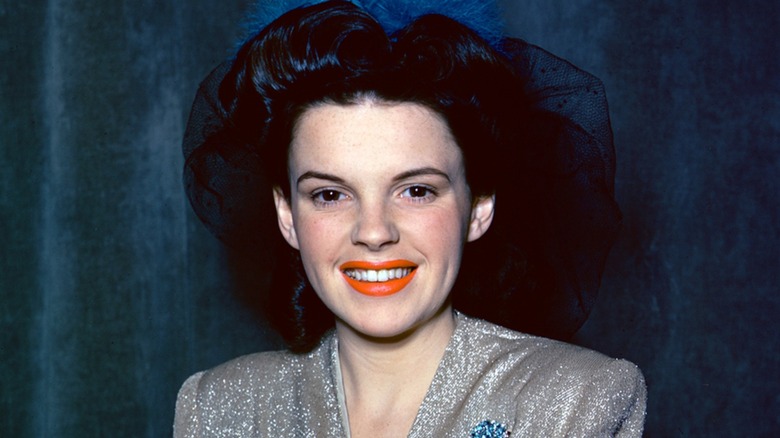12 Old Hollywood Scandals That Still Raise Eyebrows Today
Los Angeles: The City of Angels. If you listen to the "La La Land" soundtrack, it's the city of stars. It's where movies are made, stars are cemented in history, and where dreams go to be born ... or to die. Los Angeles has a dark underbelly, and it's not just modern scandals among the rich and famous that have captivated the attention of fans; this was a scandalous place in the olden days, too, back when James Dean raced the streets on his motorcycle and Humphrey Bogart puffed on endless cigars.
Ever since the early days of Hollywood, fans have been fascinated by the ins and outs of the lives of celebrities. We follow their stories in the tabloids, buy their memoirs to learn about their lives, and even watch movies about the people who made the movies we love. Though much of Old Hollywood has faded from popular memory — like the last frame of a film you can barely remember watching — there are some classic scandals that managed to rise above. These once-massive stories have continued to fascinate fans long after everyone involved has passed on; read on for 12 Old Hollywood scandals that still raise eyebrows today.
Elizabeth Taylor ruined her friendship with Debbie Reynolds by sleeping with her husband
Screen legend Elizabeth Taylor was married a stunning number of times, racking up husbands almost as quickly as she stacked her filmography with memorable roles. The "Cat on a Hot Tin Roof" and "Who's Afraid of Virginia Woolf?" star was no stranger to the gossip columns; her on-again, off-again relationship with Richard Burton provided them with fodder for decades.
When she was younger, Taylor befriended Debbie Reynolds, who starred in "Singin' in the Rain." They stayed close for a long time, but in 1959, they had a severe falling out that captured the attention of the entertainment press around the world. "[W]e had a lapse of time when she took Eddie to live with her because she liked him, too," Reynolds told People, referring to her husband, Eddie Fisher. "She liked him well enough to take him without an invitation!"
Taylor, who was at the time grieving the loss of her husband Mike Todd in a plane crash, had turned to Fisher — his friend — for support. Their wedding shocked everyone, but ultimately they too got divorced when Taylor got with Burton. In a documentary called "Elizabeth Taylor: The Lost Tapes" (via The New York Post), Taylor expressed her regret for the whole situation. "I don't remember too much about my marriage to him," Taylor said, "except it was one big, friggin' awful mistake."
Marilyn Monroe may have had affairs with both JFK and his brother
President John F. Kennedy had many alleged mistresses, but chief among them was Marilyn Monroe, star of classic films like "Gentlemen Prefer Blondes" and "The Seven Year Itch." She was a legendary blond bombshell, the pinnacle of Hollywood glamour and sexiness, and when she sang "Happy Birthday, Mr. President" in a slinky dress so stunning that Kim Kardashian later wore it to the Met Gala, tongues were set wagging. Could it be that the president of the United States was having an affair with the most beautiful woman in Hollywood?
"[I] never saw any evidence of an affair," former Secret Service Agent Jerry Blaine told People decades later, "but I don't know what happened behind closed doors."
In fact, JFK wasn't the only Kennedy that Monroe allegedly had an affair with. Supposedly, his brother Robert F. Kennedy also had a dalliance with the star of "Some Like It Hot." At least, that's the story according to Joe DiMaggio, one of Monroe's ex-husbands. As he told biographer John Positano, he believed her affairs with the Kennedy brothers led to her death. "I always knew who killed her, but I didn't want to start a revolution in this country," he said. "She told me someone would do her in, but I kept quiet." Whether she truly overdosed, either accidentally or on purpose — and whether the Kennedys had anything to do with that — we may never know.
Lana Turner's gangster boyfriend was murdered by her daughter ... maybe
In 1958, Hollywood was stunned by a brutal murder. Lana Turner's boyfriend, a gangster named Johnny Stompanato, had evidently been killed by her own daughter, Cheryl Crane. Crane reportedly stabbed her mother's boyfriend with a butcher knife. LA lit up with rumors as everyone raced to figure out how such a shocking thing could have happened. Soon enough, people began to talk, and it seemed that Turner's relationship with Stompanato had been on the rocks for a while anyway. "He started roughing her up, and things got increasingly ugly," one actor said (via Vanity Fair). "After she wouldn't allow him to escort her to the Academy Awards ... he beat her savagely."
So ... had Crane done it to save her mother? Or perhaps herself? Evidently, it was a combination of both; according to Crane, Stompanato had threatened to slice her mother's face, and Crane killed him to protect Turner. Soon, the place was crawling with cops, private investigators, lawyers, and more. Reporter James Bacon watched Turner's interrogation. "I heard her asking, 'Can I take the blame for my baby?' or some such thing," he recalled, "and [Police Chief Clinton] Anderson tells her, 'Not unless you actually committed the crime.' And Lana bows her head and says, 'Okay, Chief, it was my daughter.'"
Tab Hunter's agent outed him to Confidential Magazine to protect Rock Hudson
In the 1950s, teenagers around the country were enthralled by "matinee idols." Good-looking young men got movie audiences dreaming of chaste dates with these dashing young guys. One such matinee idol was Tab Hunter, star of films like "The Girl He Left Behind" and "Battle Cry." Hunter had a secret, though: He was gay. In "Tab Hunter Confidential," a memoir that was later turned into a documentary, Hunter recalled thinking that his agent, Henry Willson — a real-life character in Netflix's "Hollywood" — was predatory. "Henry put the make on me every now and then," Hunter recalled (via IndieWire). "[O]ccasionally his knee would push against your knee."
Willson also managed the career of Rock Hudson, a much bigger star than Hunter ... who was also in the closet. In 1955, Confidential Magazine went to Willson and told them they had evidence that Hudson was gay. Rather than allowing his biggest client to be outed in the press, Willson offered them Hunter's secret in exchange for their silence about Hudson.
"He made them aware of the fact that five years earlier, before I was anybody, I had been arrested for disorderly conduct when police raided a party at which I — and a number of other gay people — were in attendance," Hunter later recalled to The Hollywood Reporter. Confidential reported on Hunter's arrest at a "limp-wristed pajama party," and his career never fully recovered.
Questions remain about Fatty Arbuckle's innocence
One of Old Hollywood's oldest — and biggest — scandals involved a silent film star named Roscoe "Fatty" Arbuckle. In 1921, he was arrested on suspicion of having raped and murdered an aspiring actor named Virginia Rappe, who died of a ruptured bladder several days after she partied with Arbuckle. Allegedly, witnesses heard her call from his hotel room, "I'm dying ... he hurt me," (via SFGate) and Arbuckle was put on trial for her death. He reportedly sent in a statement to the Los Angeles Times (via PeopleVsArbuckle.com) insisting that he was innocent. "After Miss Rappe had a couple of drinks she became hysterical and I called the hotel physician and the manager," he said simply.
The newspapers had a field day with the situation. The San Francisco Examiner: "SF BOOZE PARTY KILLS YOUNG ACTRESS." The Chicago Herald Examiner: "ARBUCKLE FACES GALLOWS." You get the idea. Film fans couldn't get enough of the story, fascinated by the idea that someone from the movies could be so depraved.
Except ... he may not have done anything wrong. Arbuckle was ultimately acquitted of her murder not once, not twice, but three separate times. When the jury read their not guilty verdict in the third trial, they added, "Acquittal is not enough for Roscoe Arbuckle. We feel that a great injustice has been done him."
The Mafia threatened Sammy Davis Jr. for dating Kim Novak
Sammy Davis Jr. was part of Classic Hollywood's legendary Rat Pack, a loose collection of singers and actors that also included Frank Sinatra. They made music, they made movies, and when they did something wrong, boy, did they make headlines. In 1964, for example, Davis was involved in a famous mistake made on Oscar night; he was handed the wrong envelope and read the wrong winner, much like the infamous "La La Land"/"Moonlight" mixup decades later.
In 1957, however, Davis was embroiled in a scandal of a different sort ... one that had to do with how openly racist Hollywood was at the time. Blind gossip items paired him with Kim Novak, the star of Alfred Hitchcock's "Vertigo," and the interracial relationship sent shockwaves through the studio system. "She hadn't thought about me any more than I had thought about her — until it was forbidden," Davis wrote in his autobiography "Sammy" (via Smithsonian Magazine).
They started seeing one another for real, but studio boss Harry Cohn put a stop to the relationship by ordering the Mafia to kill Davis. "They said they would break both of his legs, put out his other eye, and bury him in a hole if he didn't marry a Black woman right away," his friend Arthur Silber later recalled. Davis did exactly that, marrying Loray White within weeks. A rueful Davis reportedly asked his friend, "Why won't they let me live my life?"
Gloria Grahame left her husband for his teenage son
Director Nicholas Ray was the man behind hit films like "Rebel Without a Cause" and "In A Lonely Place," the latter of which starred his wife, Gloria Grahame. The former is a film all about daddy issues, which makes sense; Ray had quite the complicated relationship with his own status as a father. After all, Grahame left him for his son. That son, we should mention, was a teenager the first time they got together, meaning Grahame was abusing her stepson.
In 1951, Ray walked in on Grahame in bed with Tony Ray, his son; at the time, he was only 13. Rather than leading to police charges, the shocking incident led to the breakup of their marriage, and Ray reportedly said (via Slate), "I was infatuated with her, but I didn't like her very much." She went on to marry someone else, but then a decade after she was initially discovered with Tony, Grahame confessed that she'd gone on to marry him too.
People were, understandably, outraged. "I married Nicholas Ray, the director. People yawned," Grahame later said (via The Sun). "Later on I married his son and from the press's reaction you'd have thought I was committing incest or robbing the cradle." To quote that meme of Tokyo Toni: Well, yes!
Superman star George Reeves might have been murdered
In 1959, George Reeves was found dead in his room of a gunshot wound. The actor had played Superman on "The Adventures of Superman," that decade's television show about the iconic Man of Steel, and at first, authorities ruled it a suicide. Still, there were many things about the situation that didn't quite make sense. When he supposedly shot himself, an actor named Leonore Lemmon was sitting in the living room downstairs with a writer who'd been working on a piece about the actor. "In a moment you will hear a gun," she told the writer when Reeves went upstairs (via the Los Angeles Times). Sure enough, the gunshot blast came. She insisted she'd only been joking, but the oddity was enough to launch quite the rumor mill.
At the time of his death, Reeves had apparently also been having an affair with Toni Mannix, wife of notorious studio "fixer" Eddie Mannix. Much later, a publicist named Edward Lozzi told "Extra" and then the LA Times that Toni had confessed to him on her deathbed that she and Eddie arranged Reeves' death. "She was absolutely terrified of going to hell," Lozzi said.
Reeves is not the only Superman actor to experience tragedy; check out these tragic details about "Smallville" star Tom Welling.
Ingrid Bergman and Roberto Rosselini's affair was so scandalous the Senate denounced them ... and later apologized
There are many tragic details about Ingrid Bergman, star of films like "Casablanca" and "Notorious." One of the most — excuse us — notorious was her romance with director Roberto Rossellini. Though they would eventually get married and stay together for years, Bergman was already married to someone else at first. She and Rossellini had a child — actor Isabella Rossellini — out of wedlock, to the horror of conservative, postwar American society.
Their affair was so scandalous, in fact, that Bergman and her beau were condemned by United States Sen. Edwin C. Jackson. "[She is] one of the most powerful women on Earth — I regret to say a powerful influence for evil," Jackson said on the floor of the Senate (via The New York Times). "Out of the ashes of Ingrid Bergman will grow a better Hollywood." Yikes.
By 1972, however, it was hard to remember why people had been so angry with her. Sen. Charles Percy formally apologized to Bergman and Rossellini, reading remarks into the Senate record that read, "I know that across the land, millions of Americans would wish to join me in expressing their regrets for the personal and professional persecution that caused Ingrid Bergman to leave this country at the height of her career."
John Wayne nearly attacked Sacheen Littlefeather at the Oscars
John Wayne made a career out of attacking Native Americans on-screen, slaughtering untold numbers of them across the many Westerns he starred in. At the 1973 Oscars, however, Wayne nearly attacked a Native American woman for real. In one of the most controversial moments in Oscars history, Marlon Brando refused to accept the best actor award for his role in "The Godfather." Instead, he sent an activist named Sacheen Littlefeather in his place.
Littlefeather told the stunned audience that Brando wanted her to make a statement about the treatment of Native Americans in the film industry, and that she would be passing along his statement to the press. "I beg at this time that I have not intruded upon this evening and that we will in the future, our hearts and our understandings will meet with love and generosity," she said, a statement that was apparently so offensive to Wayne that he reportedly had to be physically held back from rushing the stage to assault her.
Decades later, the Academy apologized to Littlefeather for the racist treatment she'd endured after the incident. In a 2022 statement (via Al Jazeera), Academy President Dave Rubin said, "For too long the courage you showed has been unacknowledged."
Oscar winner Hattie McDaniel had to get special permission to attend the ceremony because she was Black
When Hattie McDaniel was nominated for the best supporting actress Oscar for her role in "Gone with the Wind," her nomination presented a problem for an Academy not used to nominating Black actors. Things were so bad in 1940, after all, that the Ambassador Hotel — where the ceremony was to take place — refused to let African Americans inside. Super-producer David O. Selznick reportedly had to seek a special waiver so that his star could attend.
Though they let her in, she had to sit in the back of the room, away from the rest of the cast. When she won, she made history. McDaniel took the stage and said (via Time), "It has made me feel very, very humble, and I shall always hold it as a beacon for anything that I may be able to do in the future. I sincerely hope I shall always be a credit to my race and to the motion picture industry."
Unfortunately, McDaniel's Oscar later went missing from Howard University and has never been found. Though she broke barriers, she found herself playing maids and servants for much of the rest of her career. According to The Hollywood Reporter, she sadly mused, "It was as if I had done something wrong."
Judy Garland was fed pills by the studio
Judy Garland was positioned to be famous from a very young age. She was a child star long before "The Wizard of Oz," forced to act in musicals that took advantage of her beautiful voice and enviable tap-dancing skills. Garland had a messy bond with her mother because of how difficult her childhood was, and that's not even to mention the fact that the studio itself forced her to take pills.
Infamous studio boss Louis B. Mayer, one of the heads of MGM, was reportedly dissatisfied with Garland's appearance in a musical called "Pigskin Parade." He called her a "fat little pig with pigtails" (via Biography), and he insisted that her handlers give her diet pills and amphetamines. They kept her slim and awake, allowing the studio to make her work endlessly. "[T]hey'd wake us up and give us the pep pills again so we could work 72 hours in a row," she told one biographer. "Half of the time we were hanging from the ceiling, but it was a way of life for us."
She struggled with addiction for the rest of her life, at one point reportedly confessing, "At times I have been pretty much of a walking advertisement for sleeping pills." When she died in 1969, she was only 47.
